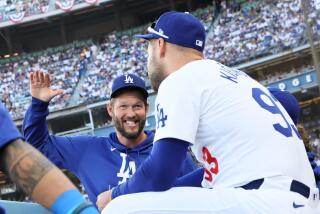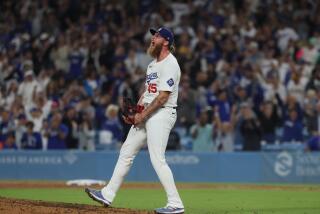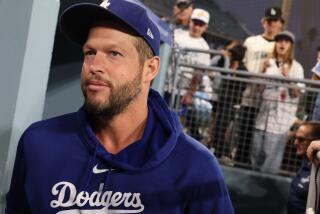Back to Whack
Eric Karros may never forget the first time he encountered a baseball player with serious back trouble. The sight of former teammate Cory Snyder is etched in the Dodger first baseman’s mind, same as his first big league home run.
“He came into the clubhouse one day [in 1993], and he was legitimately crooked,” Karros said. “I mean, his bellybutton was, I swear, three inches to the right. I’m thinking to myself, ‘What the heck is this? This is a joke, right?’ I didn’t understand it.”
He understood it last season, and all too well. Karros tore a lower-back muscle lifting weights a week before spring training in 2001, and by the time he got to Dodgertown he was as crooked as a lightning bolt.
Karros played hurt all season, with the exception of a three-week stint on the disabled list, and was a shadow of his normal self, batting a career-low .235 with 15 home runs and 63 runs batted in. In his first nine seasons, he had hit .270 and averaged 27 homers and 93 RBIs.
It was almost as painful to watch Karros as it was for him to swing a bat. Never the fleetest of foot or nimblest in the field, Karros hobbled around the basepaths and strained to make anything beyond routine defensive plays.
There was a day in Pittsburgh when Karros couldn’t hit a ball to the warning track--in batting practice. There was a day in Colorado when Karros took himself out of a game, which, for a power hitter in the thin air of Coors Field, is akin to a poker player folding with a full house, aces high.
There were those persistent, agonizing questions in Karros’ mind: Am I helping the team by playing hurt? Would the team be better off with someone else at first base? Am I ever going to feel right again?
There were off-field problems. Karros’ mother, Karen, was battling breast cancer, and Karros was being harassed by a 45-year-old Leucadia man who later was charged with stalking and making threats. The man allegedly followed Karros around the country and took gifts to Karros’ parents’ house.
Karros, the National League rookie of the year in 1992, declined to discuss his personal life but did acknowledge that both issues took a toll. A Dodger official said the stalking case “was on [Karros’] mind” for much of the season.
“From a statistical standpoint, it was the toughest year of my career; it was very frustrating,” Karros said. “It wasn’t like it was so unbearable I couldn’t get out of bed in the morning. But it was a bad season.”
Six months later, Karros’ world seems right-side up.
His mother’s cancer is in remission, and Karen is feeling much better.
Joseph Mychel Prudhomme pleaded no-contest last fall to three misdemeanor counts of stalking, making threats and violating a restraining order. He was ordered to serve six months at a live-in mental facility and to stay away from Karros, his family and Dodger Stadium until 2011.
And Karros’ back feels great, thanks to his winter work with Vancouver physical therapist Alex McKechnie, whose cutting-edge techniques helped Karros rehabilitate himself to such a degree that Karros has no doubt he will return to his former production levels this season.
The Dodgers can afford nothing less. With Gary Sheffield traded to Atlanta for Brian Jordan, Karros, 34, is probably the pivotal player in the Dodger offense.
If he can bring his normal production--25 homers, 30 doubles, 100 RBIs--to the sixth or seventh spot, it will ease Sheffield’s loss and provide better protection for the heart of the order.
“I don’t see any reason why I’m not going to have a year that is comparable [to] or better than any year I’ve had in the past,” Karros said. “I can do things now that I haven’t done in 10 years.”
It can’t get any worse than last season. Karros thought his initial injury was minor, so he didn’t tell Dodger trainers. He figured he was a little stiff and would be fine in a few days, but after a red-eye flight from Los Angeles to Orlando, Fla., and a long van ride to Vero Beach, he could barely walk into camp.
“I was crooked,” Karros said. “I don’t think I was ever any worse than that.”
Karros missed most of spring training but was able to start the season. A month and a half in, he aggravated the back and was put on the disabled list. He was activated in mid-June and played for a week, hitting home runs against the Angels’ Troy Percival and Arizona’s Randy Johnson, but his back went out again.
The Dodgers debated whether to put Karros on the DL again, ultimately deciding to play him. He endured the pain, but his attempts to compensate for his injury triggered a series of bad habits that threw his swing out of whack.
“There were days I felt good, and some where I didn’t feel so good,” Karros said. “For me, the frustrating thing was, there wasn’t any type of consistency on or off the field. Physically, I wasn’t getting better. I’d go for couple days, think I was making progress and then, whack. There was never time to shut it down and get it right.”
Not until winter, when Karros began to truly understand how his body works, did he realize what was happening last season.
“My mind was saying one thing and my body was saying, ‘[Forget] this, there’s no pain, so this is the way we’re going to move and do things,’” Karros said. “I wasn’t putting myself in the most powerful positions, whether it was to react to a ball defensively, at the plate, anything.”
That was obvious to others.
“You could tell by the way he was running, the way he’d go after ground balls, that he wasn’t the same,” San Diego General Manager Kevin Towers said. “Not that he ever had terrific range on defense, but he could barely bend over. When he ran, he was tight, straight up and down. When he had to score from first [on a double] you half-expected him to be on all fours by the time he got to the plate.”
When he is sound, Karros has power to the opposite field, but he had trouble driving pitches on the outer half of the plate.
“Our scouting reports said to just stay away from him,” Towers said. “He wasn’t able to drive the ball to the right-center-field gap like he used to. He tried to pull everything.”
Karros muddled through, hoping his good days would outnumber the bad.
“Did it make sense for me to sit out? I felt with what I had accomplished, and my presence in lineup, I brought something to the team,” Karros said. “It’s not like we had Jeff Bagwell on the bench. I felt like I had some good at-bats. Was I playing at the level I played at in past? No, but I felt I did some things to help us.”
It was clear, though, that he needed help. Midway through the season, Karros’ personal trainer, Troll Subin, suggested Karros meet with McKechnie, who was coming to Los Angeles to work with Laker center Shaquille O’Neal. Karros declined, figuring he wouldn’t have time, but by the end of the season, he had no choice.
“By that time,” Karros said, “I was open to just about anything.”
McKechnie, a Scotsman who has been the Canadian national hockey team’s physical therapist for 20 years and is also a consultant to the Lakers, the NHL and the English Premier League in soccer, admits he “doesn’t know anything about baseball,” but he’s an authority on chronic groin, pelvic, abdominal and lower-back injuries.
He agreed to work with Karros on one condition: Karros would travel to Vancouver for an intensive, two-week training program. Karros did, missing Thanksgiving and his wedding anniversary, but the trip was well worth it.
With a series of elastic bands connecting Karros’ arms and legs, McKechnie showed Karros how each action triggers a reaction, how his body was unbalanced, and how his muscles were not firing in the proper sequence.
McKechnie developed a demanding three-month, high-energy exercise program designed to establish stability and strength, and to re-educate Karros’ movement patterns to produce better balance.
“Eric wanted to prevent back issues and told me he’s going to swing a bat about 200,000 times a season,” McKechnie said. “That’s a very explosive movement that you need to control, and it’s going to take a toll on anyone’s lower back. We had to establish strength to
McKechnie’s description of the program can be confusing. He uses terms such as “proximal strength” and “distal power,” and he had Karros working on a “core board,” a three-dimensional balance board McKechnie designed to create “torsional” movements.
“It’s not like he’s some quack who’s going to lay hands on you and heal you,” Karros said. “The theory is, your body fires in certain sequences, and if those are out of whack, you’re going to be in trouble. When you have pain, your body will try to stay away from that pain and fire in different sequences. Those aren’t the right sequences, but there’s no pain. Then, it may lead to other issues. You may not be as strong, as powerful, as functional, but you’re alleviating the pain.”
Karros followed McKechnie’s program all winter and carried it into this season. While teammates stretched before spring training games, Karros was often off to the side with his core board, looking like a guy in a one-man step-aerobic class, and doing leg, trunk and arm exercises that looked like a cross between martial arts and pantomime.
“I can’t explain it, and I would be doing a disservice to try to explain it--you have to ask Alex,” Karros said. “All I know is, my balance is a thousand times better, and I can do things I haven’t done in a long time. I understand things about movement that I never did.”
Manager Jim Tracy loves the result.
“He looks like two different people,” Tracy said early in spring training. “Eric Karros last year was in no way as agile as he is this spring. I’m looking at two different guys. He’s a completely different player now, and we’re excited about that.”
But will it translate to success on the field? Karros didn’t exactly tear up the Grapefruit League, hitting .173 with no home runs and three runs batted in. He still looked a little stiff on the basepaths, though he picked up his pace in the final week of games, and he’ll never be confused with J.T. Snow around the bag.
Several scouts remain skeptical about Karros’ chances of returning to his 25-homer, 100-RBI form, and the Dodgers gave Shawn Green plenty of work at first base in case Karros isn’t sound. Karros doesn’t think Plan B will be necessary.
“On the field, I feel great, and at the plate, I don’t feel good, but that’s not atypical; I don’t think I’ve ever felt good in the spring,” he said. “The difference is, I’m able to hit extra, to get extra work in. There aren’t physical issues that are holding me back, and that’s different.
“There’s no reason I shouldn’t have the typical year I’ve had in the past. I can’t sit here and say I’m going to do this, this and this. All I can say is, physically, I’ve put myself in the best position I can. Do I feel like I’m going to be successful? Yes.”
*
(BEGIN TEXT OF INFOBOX)
Down Season
(text of infobox not included)
More to Read
Go beyond the scoreboard
Get the latest on L.A.'s teams in the daily Sports Report newsletter.
You may occasionally receive promotional content from the Los Angeles Times.











